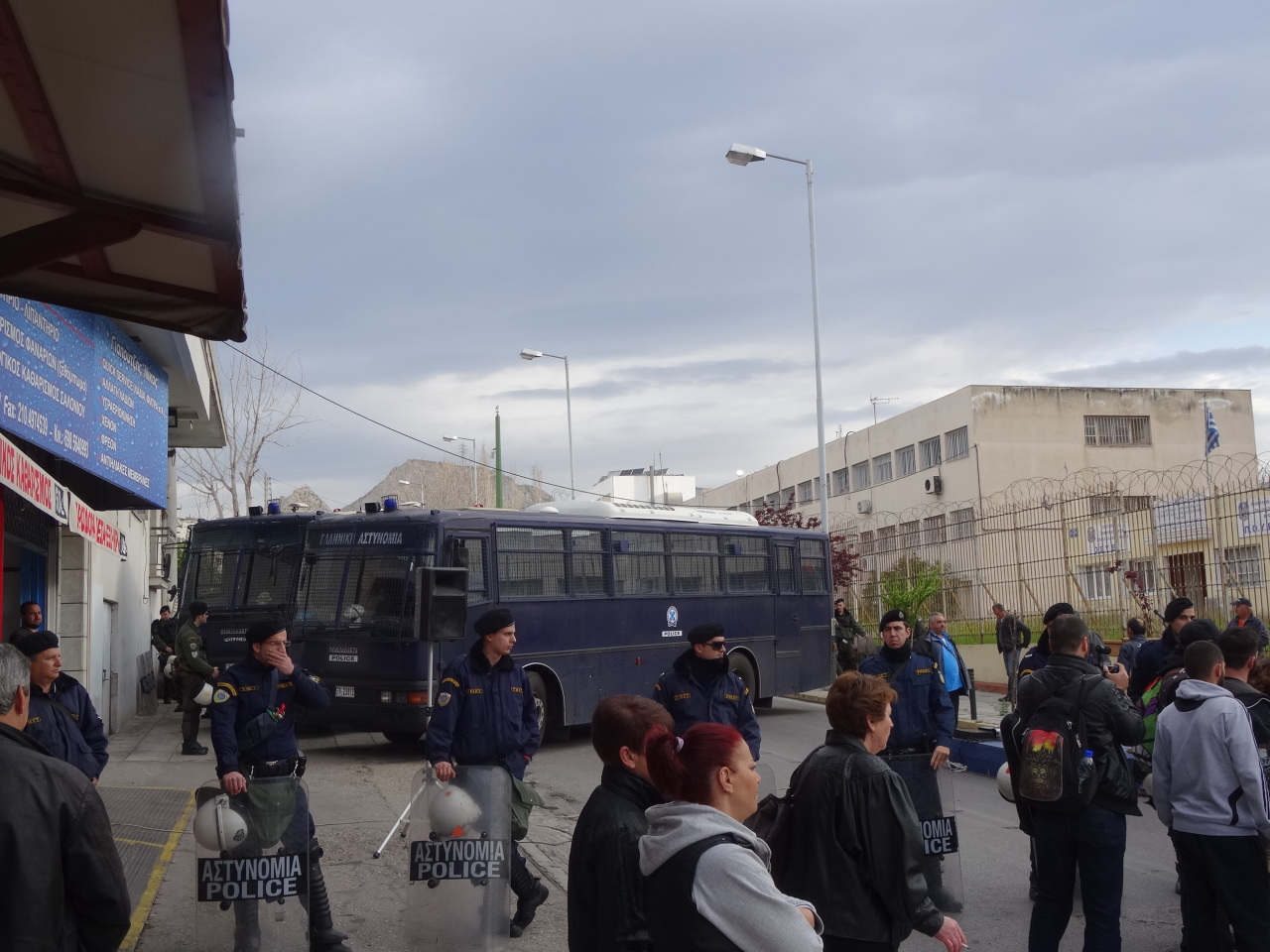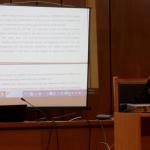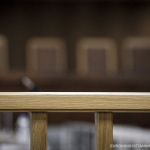The trial of Golden Dawn was adjourned until May 7th 2015 in order to allow time for Mr Papavasiliou’s appointed counsel to acquire familiarity with the case file.
1st Meeting, Korydallos Prisons, Women’s Section, Athens, 20/4/2015
The much-awaited trial of the parliamentary group itself, but also of the more humble members of Golden Dawn, had its beginning on April 20th 2015 in the women’s section of Korydallos prisons. The defendants found themselves on the bench under charges of serial felonies and multiple infringements of the penal code (as determined by the specific remission of the 215/2015 ordinance of the Appeals Council). This trial is singular in its kind – an unprecedented event in the current Greek judicial, political and social context as, aside from the nature of the accusations levied against an entire parliamentary unit and the web of factors involved in the process, the proper observance of procedural safeguards, together with the fruition of the final outcome present a critical challenge to contemporary Greek and international (legal and not only) cosmopolitanism.
I. Access to the court: The principle of universal access to the hearings is ratified by law as a measure through which to sanction the transparency of the procedures and as a means to ensure the interests of all parties concerned: witnesses, accused and the broader public called upon to take a stance.
In order for the hearings to be made fully accessible to the public, it is imperative that they be conducted in a space appropriate to the purpose. And yet, the first Section of the Three-Judge Court of Appeal for Felonies to which this seminal penal trial has been assigned seems bent on executing its meetings in a room inside Korydallos prisons – a choice of venue that presents itself as decidedly inconsistent with the purported principle of publicity the Court claims to uphold, and which thus challenges the Court’s commitment to the public nature of the trial.
Despite the heightened interest engendered by this trial (expressed both by the public at large and by journalists on a national and international platform), the inaugural meeting was consigned to said drastically inappropriate venue; the relevant authorities had made no provisions to accommodate the breadth of interest the trial would garner. This resulted in the de facto barring of the public from the proceedings. The venue in which today’s meeting unfolded cannot under any circumstances accommodate a great number of the accused or the lawyers of the victims; there are not enough seats for the lawyers for the defense and for interested journalists, while the exclusive presence of certified persons essentially barred the public from the courtroom. The sound system in place was gravely lacking, and much of what was said during the course of today’s meeting could not be grasped by everyone – the result of which was the perpetual intervention of journalists appealing to the court to ensure the publicity of the meeting.
Access to the building of the Korydallos Women’s Prisons was similarly arduous as, given the security measures taken by the authorities, the main entrance to the women’s prison (and to the courtroom within it) on Solomou Street was cordoned off on both sides by police vans, with the net result that the courtroom could only be accessed with police permission.
These crucial practical lapses were taken up with the Court at the end of the meeting by the mayor of Korydallos in attendance and by civil action counsel, who submitted a request for a change of venue, proposing the ceremonial hall of the Athens Court of Appeals as an alternative.
In articulating her own position, the court prosecutor stressed that:
The meeting venue was determined by the Minister of Justice.
The ceremonial hall of the Athens Court of Appeals was occupied by other trials
Some solution will transpire during the transition to a new room which will be arranged for that purpose
The application for a change of venue for the meeting cannot be submitted by civil counsel before said counsel has been formally recognized by the court
The President of the Court expressed agreement with the final conjecture.
She referred the matter to the next court date, preventing anyone else from intervening on the subject, despite the fact that even the president of ESIEA (the Athens Daily Newspaper Journalists’ Union), present in the room, demanded an explanation, highlighting the severe practical difficulties faced by her fellow journalists before and during this initial meeting.
II. Obstruction of and Attacks on Witnesses: Following the identification of the accused and the confirmation of their legal representatives, counsel for the family members of Pavlos Fyssas informed the court that two witnesses had been attacked as they reached the courtroom and requested a momentary pause to the proceedings. Following this, during the identification of the witnesses, said counsel confirmed that two witnesses were absent from the trial because they had been attacked outside the courtroom and had incurred injuries as a result.
III The Court Proceedings: The meeting began at 09:15 with the identification of the defendants and with the opening statements of the defense. 44 defendants were present. 24 defendants were absent but were represented by their counsel while, according to statements of counselors to the defense, the accused Antonis Mpoletis is deceased.
The defendant Nikolaos Papavasiliou stated that he has no legal representative and asked the court to provide counsel. The court appointed two counselors from the list of ex officio appointed lawyers of the Athens Bar Association and followed to read the names of the witnesses.
The five protected witnesses announced their presence by phone call transmitted on speakerphone. At 11:05, the trial was adjourned until May 7th 2015 in order to allow time for Mr Papavasiliou’s counsel to acquire familiarity with the case file.
The Court’s decision to interrupt the proceedings marked the end of the first session of the first Three-Judge Court of Appeal for Felonies. The purported agenda for the next meeting is the formal recognition of civil counsel and the re-examination of the request for a change of venue.
(photo: Raik Stolzenberg)









